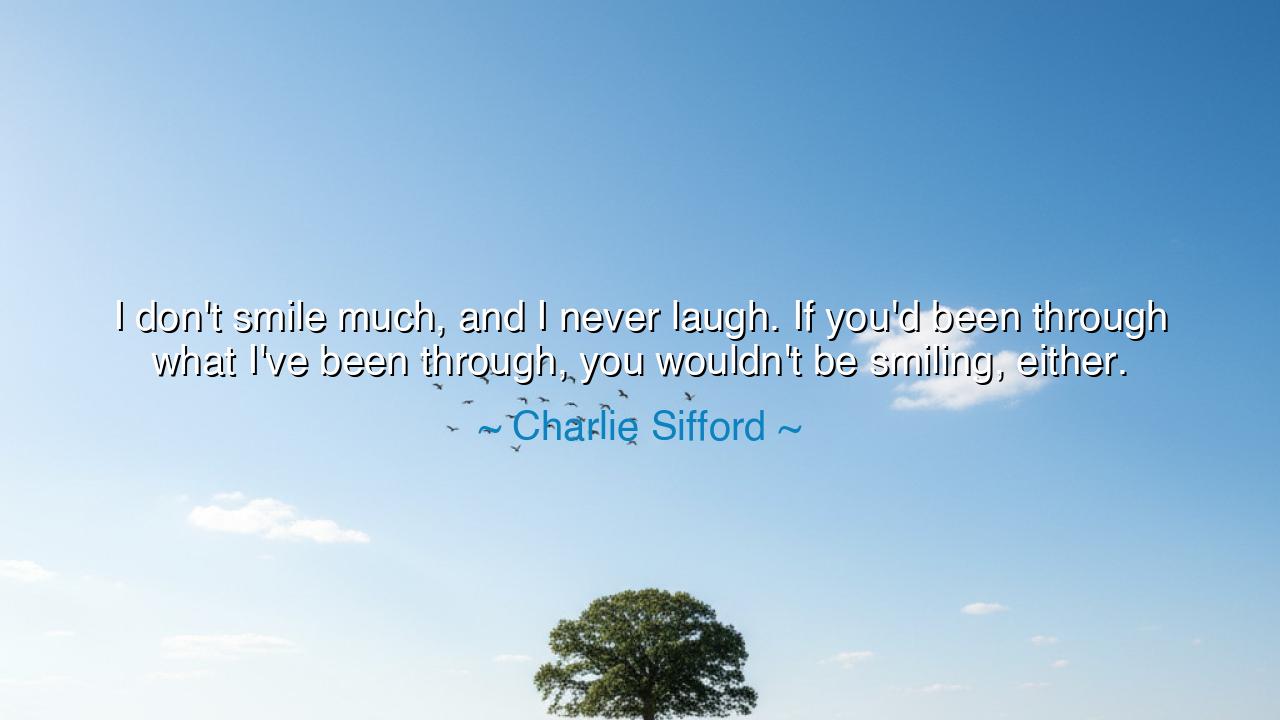
I don't smile much, and I never laugh. If you'd been through what
I don't smile much, and I never laugh. If you'd been through what I've been through, you wouldn't be smiling, either.






Charlie Sifford, the man who broke barriers in the world of golf, once said with stark honesty: “I don't smile much, and I never laugh. If you'd been through what I've been through, you wouldn't be smiling, either.” These words, heavy with sorrow and truth, are not the bitterness of a small man, but the testimony of one who bore wounds few could imagine. They reveal the weight of discrimination, the scars of endurance, and the solemn dignity of a soul who carried injustice yet still pressed forward. His lack of smile is not a rejection of joy, but a reminder of the price of survival.
The ancients often spoke of the way suffering shapes the soul. The Greeks called it pathei mathos—through suffering, learning. In Sifford’s words, we hear the echo of that wisdom: that pain endured strips away the trivialities of life, leaving only the raw essence of truth. To live through relentless opposition, to be denied dignity, to be scorned for the color of one’s skin in a game reserved for others—this is to walk through fire. And when a man has walked through fire, laughter no longer comes cheaply.
History bears witness to such men. Consider Frederick Douglass, born into chains, who escaped slavery to become one of the greatest orators of his age. His writings carried not light jest, but fiery truth, for he had endured too much to treat life lightly. His voice thundered against injustice, yet behind it was a sorrow that never fully left him. Like Sifford, he did not smile easily—not because he lacked joy, but because his mission and his memory were too profound for trivial laughter.
Charlie Sifford’s words also teach us about the loneliness of pioneers. To be the first Black man to win the right to play on the PGA Tour was to stand in the storm of hatred, jeers, and isolation. He was denied entry to tournaments, forced to endure slurs, and made to fight battles that his white peers could not comprehend. His seriousness, his refusal to smile, became his armor. It told the world: I will not be broken, I will not play the fool, I will carry my dignity even if it costs me warmth.
Yet within his statement is also a lesson of empathy. When Sifford says, “If you'd been through what I've been through, you wouldn't be smiling, either,” he is asking us to see through another’s eyes. Too often we judge others by appearances: a stern face, a quiet spirit, a lack of visible joy. But Sifford reminds us that behind every expression is a story. Before we demand that someone laugh, we must ask what burdens they carry. Compassion grows when we remember that not every heart has had the luxury of ease.
At the same time, his words offer a form of strength. To smile is easy when the road is smooth. To stand firm without the comfort of joy, to continue despite scars—that is heroic. Sifford may not have smiled much, but he changed the face of golf forever. His seriousness gave birth to opportunity for generations to come, and in that, his unyielding spirit smiled for all who followed. Sometimes, the greatest smiles are not on lips but in legacies.
So, my children, learn from Charlie Sifford. Do not be quick to judge the faces of those who do not smile, for they may be the ones who endured the hardest storms. Respect the dignity of their silence, and honor the strength that lies beneath it. And for yourselves, remember this: suffering will come, but let it shape you into steel, not ashes. If joy flees, hold fast to purpose. For in the end, even a life without laughter can bring light to others, and even a face without smiles can shine with unbreakable greatness.






AAdministratorAdministrator
Welcome, honored guests. Please leave a comment, we will respond soon